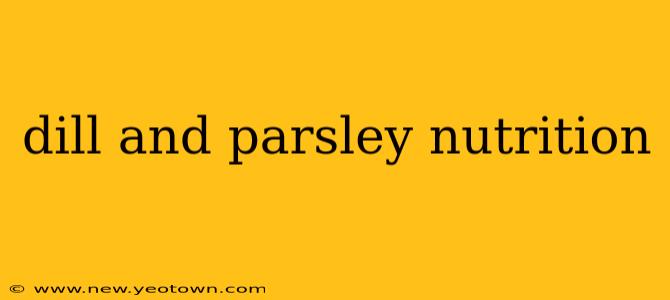Imagine this: you’re whipping up a vibrant summer salad, the scent of fresh herbs filling your kitchen. A sprinkle of bright green parsley, a delicate scattering of feathery dill – these aren't just garnishes; they're nutritional powerhouses, quietly boosting the health benefits of your meal. Let's delve into the fascinating world of dill and parsley nutrition, exploring their unique benefits and answering some common questions.
What are the nutritional benefits of dill?
Dill, with its subtly anise-like flavor, is a culinary treasure. But beyond its deliciousness lies a wealth of nutrients. This unassuming herb is packed with vitamins A, C, and K, essential for vision, immunity, and blood clotting respectively. It also boasts a good dose of antioxidants, those microscopic warriors that fight off cell-damaging free radicals. Regular consumption of dill may contribute to improved digestion and even help alleviate menstrual cramps, thanks to its antispasmodic properties. The fiber content aids in maintaining a healthy digestive system, preventing constipation and promoting regularity.
What are the nutritional benefits of parsley?
Parsley, often overlooked as a mere garnish, is a nutritional superstar in its own right. This vibrant green herb is an excellent source of vitamin K, crucial for bone health and blood coagulation. It's also brimming with vitamin C, an antioxidant that strengthens the immune system and protects against cellular damage. Parsley's impressive vitamin A content contributes to healthy vision and skin. Furthermore, it contains folate, vital for cell growth and development, particularly crucial during pregnancy. The presence of antioxidants and phytonutrients in parsley contributes to its anti-inflammatory properties, potentially reducing the risk of chronic diseases.
Is dill or parsley better for you?
This isn't a competition! Both dill and parsley offer unique nutritional profiles. The "better" choice depends on your individual needs and preferences. If you're looking to boost your vitamin K intake significantly, parsley might be slightly ahead. However, dill's unique blend of nutrients and potential digestive benefits make it a valuable addition to a healthy diet as well. The best approach is to incorporate both into your culinary repertoire to reap the benefits of both herbs.
How many calories are in dill and parsley?
Both dill and parsley are incredibly low in calories, making them guilt-free additions to any diet. A typical serving of either herb provides negligible calories, contributing to a healthy and balanced lifestyle without impacting your calorie count significantly. This makes them ideal for those watching their weight or seeking healthy, flavor-enhancing additions to their meals.
What are the health benefits of dill and parsley?
The health benefits of dill and parsley are numerous and interconnected. Their rich antioxidant content helps combat free radical damage, potentially reducing the risk of chronic diseases. The vitamins and minerals they provide support various bodily functions, from maintaining healthy bones (vitamin K) to boosting immunity (vitamin C). Their fiber content aids digestion, and some studies suggest potential benefits in reducing inflammation and improving cardiovascular health.
Can you eat too much dill or parsley?
While generally safe, consuming excessive amounts of dill or parsley may lead to some side effects. In rare cases, large quantities can cause allergic reactions. Individuals on blood thinners should consult their doctor before significantly increasing their intake of parsley due to its high vitamin K content, which can interact with blood-thinning medication. Moderation is key, as with any food.
Are dill and parsley good for weight loss?
Their low-calorie nature and high fiber content make both dill and parsley beneficial for weight management. The fiber helps you feel full and satisfied, reducing overall calorie intake. Adding these herbs to your meals enhances flavor without adding significant calories, promoting a healthier dietary approach to weight loss.
In conclusion, both dill and parsley are versatile, flavorful herbs packed with essential nutrients that contribute to overall well-being. Incorporating these culinary gems into your diet is a simple yet effective way to boost your health and add a burst of fresh flavor to your meals. Remember to enjoy them in moderation as part of a balanced and varied diet.

